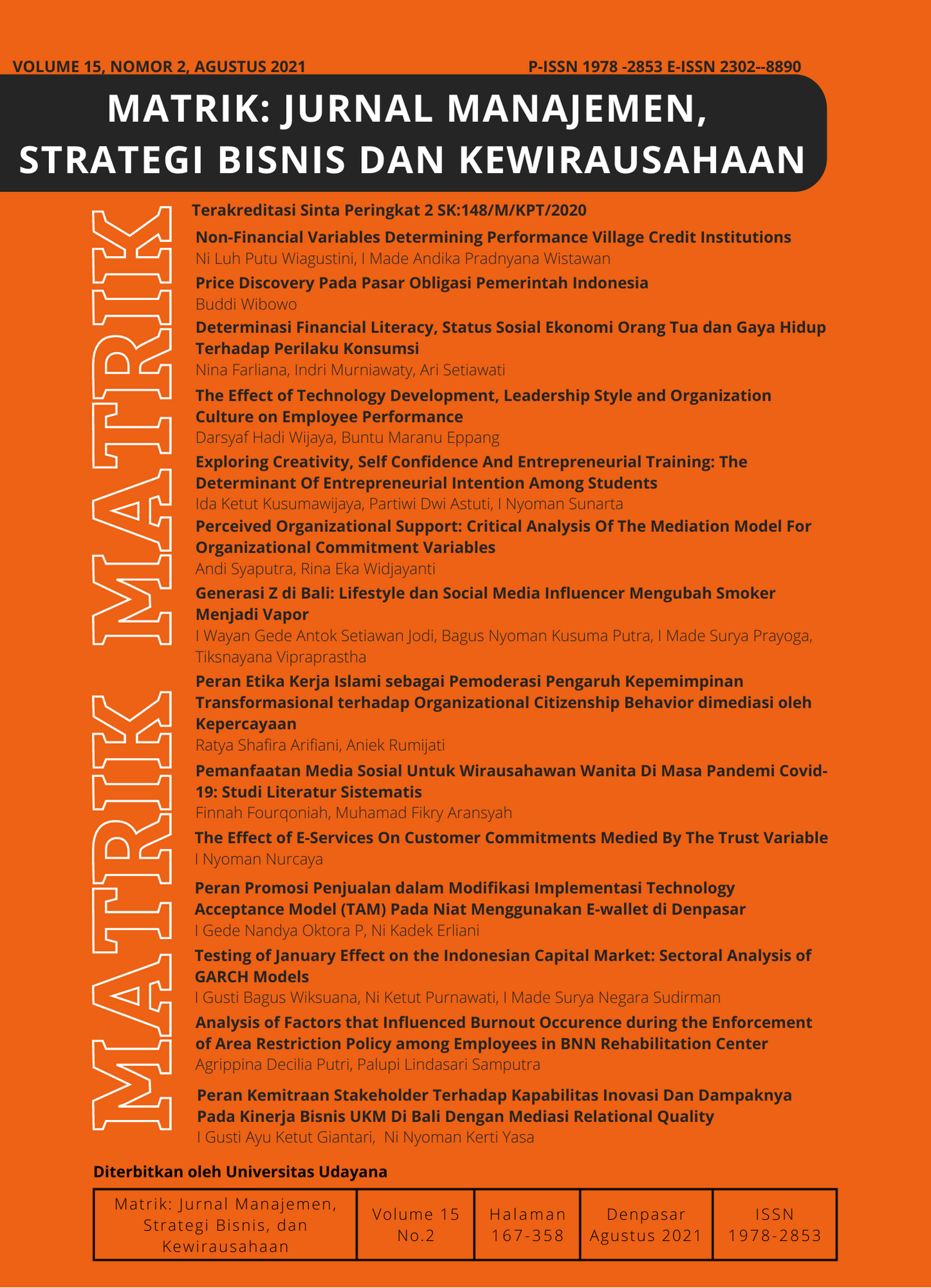Peran Etika Kerja Islami sebagai Pemoderasi Pengaruh Kepemimpinan Transformasional terhadap Organizational Citizenship Behavior dimediasi oleh Kepercayaan
Abstract
This study aims to analyze the direct and indirect effects of the transformational leadership and organizational citizenship behavior. Accordingly, it needs to add the mediating variables, namelythe trust and Islamic work ethic in order to evaluating the effects of moderation. The object of this study (population) is all members of staff at the syariah rooms, one of the guest house in Malang. This study instrumentalizes the probabilty sampling technique in dealing with a total sample of 50 respondents. Meanwhile, the data analysis of this study is the path analysis. This study finds that the transformational leadership seems to have no effects on the organizational citizenship behavior, but on trust. In this context, the trust has had an effect on theorganizational citizenship behavior and has mediated the effect of transformational leadership on organizational citizenship behavior.The Islamic work ethics has had no moderation effect onthe transformational leadership ofthe organizational citizenship behavior. Although the result of this study seems to be specific, it needs to be supported by the larger scale of study and advancement of the research variable in order to find larger patterns of study in the similar field.
Downloads
References
Ali, A., A. O. (2008). Islamic Work Ethic in Kuwait. Journal of Management Development, 14.
Altuntas, S., & Baykal, U. (2010). Relationship Between Nurses Organizational Trust levels and Their Organizational Citizenship Behavior. Journal of Nursing Scholarship.
Azizah, SN., Ma’rifah, D. (2010). Analisis Pengaruh Etika Kerja Islami terhadap Kepuasan kerja, Komitmen Organisasi dan Organizational Citizenship Behavior (OCB) pada Karyawan di Yayasan Al-Huda Kebumen. Jurnal Riset Ekonomi Manajemen.
Bass, B. M., & Avolio, B. . (1994). Improving Organizational Effectiveness Through Transformational Leadership. Sage Publications Inc.
Benny Hutahayan, Endang Siti Astuti, Kusdi Raharjo, D. H. (2013). ITHE EFECT Of TRANSFORMATIONAL LEADERSHIP, ORGANIZATIONAL CULTURE, REWARD TO ORGANIZATIONAL CITIZENSHIP OF EMPLOYEE BEHAVIOR AT PT BARATA INDONESIA (PERSERO). 466–474.
Chiang, C. F., & Hsieh, T. S. (2012). The Impacts of Perceived Organizational Support and Psychological Empowerment on Job Performance: The Mediating Effects of Organizational Citizenship Behavior. International Journal of Hospitality Management, 3, 180–190.
Han, S. H., Gaeun, S., Seung, W. Y., & Dong-Yeol, Y. (2015). Transformational leadership and knowledge sharing Mediating roles of employee’s empowerment, commitment, and citizenship behaviors. Journal of Workplace Learning, 28(No.3), 130–149.
Indrayanto, A., EA, T., Surachman, & Noermijati. (2011). Efek Pemediasian Kepercayaan terhadap Pengaruh Kepemimpinan Transformasional pada Komitmen Pegawai Satpol PP di Eks Karesidenan Banyumas. Jurnal Aplikasi Manajemen.
Irkhami, N. (2014). Islamic Work Ethics: Membangun Etos Kerja Islami. STAIN Salatiga Press.
Jha, S. (2014). Transformational leadership and psychological empowerment. South Asian Journal of Global Business Research, 3(1), 18–35. https://doi.org/10.1108/sajgbr-04-2012-0036
Khalili, A. (2017). Transformational leadership and organizational citizenship behavior. Leadership & Organization Development Journal, 38(7), 1004–1015. https://doi.org/10.1108/lodj-11-2016-0269
Kim, H. (2013). Transformational Leadership, Organizational Clan Culture, Organizational Affective Commitment, and Organizational Citizenship Behavior: A Case of South Korea’s Public Sector. Springer Science+Business Media New York.
Luthans, F. (2006). Perilaku Organisasi edisi sepuluh. Andi.
Maharani, V., Troena, E. A., & Noermijati, N. (2013). Organizational citizenship behavior role in mediating the effect of transformational leadership, job satisfaction on employee performance: Studies in PT Bank Syariah Mandiri Malang East Java. International Journal of Business and Management, 8(17), 1–12.
Mayer, Roger, C., Davis, James, H., & Schoorman, F. D. (1995). an integrative model of organizational trust. Academy of Management Review, 20(3), 709–734.
Organ, D. ., & Philip M.P. (2006). Organizational Citizenship Behavior: Its Nature, Antecendent, And Consequense. Sage Publications Inc.
Robbins, S. P., & Judge, T. A. (2015a). Perilaku Organisasi. Salemba Empat.
Robbins, S. P., & Judge, T. A. (2015b). Perilaku Organisasi edisi 16. Salemba Empat.
Schoorman, F., Mayer, R., & Davis, J. (2007). An integrative model of organizational trust: past, present, and future. Academy of Management, 32(2), 344–354.
Suliman, A., & Al Obaidli, H. (2013). Leadership and organizational citizenship behavior (OCB) in the financial service sector: The case of the UAE. Asia-Pacific Journal of Business Administration, 5(2), 115–134. https://doi.org/10.1108/17574321311321603
Sutanto, M., & Setiawan, R. (2018). Pengaruh Perceived Organizational Support (POS) terhadap Organizational Citizenship Behavior dengan Organizational Trust sebagai variabel Intervening di Hypermart Royal Plaza Surabaya. AGORA, 6(1).
William, L. ., & Anderson, S. . (1991). Job Satisfaction and Organizational Commitment as Predictors of Organizational Citizenship and In-Role Behaviors. Journal of Management, 17(3), 601–607.
Yilmaz, A., & Atalay, C. G. (2009). A Theoretical Analyze on The Concept of Trust in Organisational Life. European Journal of Social Sciences, 8(2).
Yukl, G. (2010). Leadership on Organization. Pearson Prentice Hall.
Zeinabadia, H., & Rastegarpour, H. (2010). Factors affecting teacher trust in principal: testing the effect of transformational leadership and procedural justice. Procedia - Social and Behavioral Sciences, 5, 1004–1008.
 This work is licensed under a Creative Commons Attribution-ShareAlike 4.0 International License.
This work is licensed under a Creative Commons Attribution-ShareAlike 4.0 International License.

















